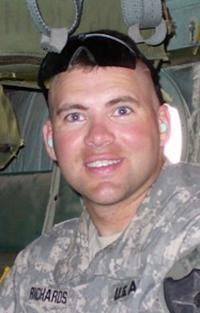(The Center Square) – In the spring of 2007, U.S. Army Capt. Ben Richards was serving in Iraq when the eight-ton armored vehicle he was traveling in was struck by a suicide bomber in a sedan loaded with 200 pounds of explosives.
The five-member crew all survived; the Stryker was destroyed.

Capt. Ben Richards, U.S. Army
“We were all able to walk out,” Richards, a West Point graduate, recalled in an interview with The Center Square. “We are all pretty wobbly. There was a period during the blast when I was temporarily unconscious.”
The U.S. Army at the time had not yet fully recognized the potential long-term impact of traumatic brain injury, Richards said.
When he returned to the forward operating base, Richards had a post-blast assessment by doctors.
“I was not able to walk straight,” he recalled. “I was wobbling around several hours after the blast and I couldn’t see straight.”
Despite the injuries, Richards went immediately back into the fight.
“I was a troop commander and you don’t just take a knee lightly when you are a leader,” Richards explained.
The unit set out on another operation the day after the suicide bomber attack. The soldiers engaged in firefights as Richards was struggling to maintain consciousness from his earlier head injuries.
“I was actually passing out during these little skirmish engagements,” said Richards.
During the battles, Richards remembers his radioman shaking him to wake him up, saying, “Sir, they are shooting at us, they are shooting at us!”
Richards was not alone. He estimates that more than 90% of the soldiers serving in his command had at least one traumatic brain injury largely because of the abundance of improvised explosive devices in the roadways and other locations. Many of those soldiers also returned to the battlefield despite their injuries.
Richards overcame years of hardship and pain before finding a solution – hyperbaric oxygen treatment therapy, colloquially known as HBOT – that finally worked for him.
After Richard’s tour was over, he returned to the United States to his wife and three children. He describes his condition as “a complete mess.”
The first night home, he had a nightmare and literally threw his wife out of bed, thinking she was an enemy soldier. His wife cried and urged him to get help.
The military guidance at the time was not to seek mental health services for at least three months, unless suicidal. The thinking was that post-traumatic stress syndrome would not surface for at least that long after a soldier was out of combat.
Despite debilitating headaches and difficulty sleeping, Richards remained in a command position for another eight months but remembers that he did a “horrible, horrible job.”
He was eventually diagnosed with both a traumatic brain injury and post-traumatic stress disorder, commonly called PTSD.
In civilian life, his brain still perceived constant threats all around him. The traumatic brain injury made it difficult to process the threats in a rational way. In combat, the brain often overcomes fear with anger – someone is shooting at you and that makes you mad. As a civilian, that anger could instead be directed at friends and family members – not a positive outcome.
Lack of sleep and constant headaches didn’t help matters.
Richards went to counseling, but there was no mindset in the military at the time about chronic brain injuries, Richards said. The thinking was that the brain would heal itself over time.
He could not afford financially to take a medical retirement, with three children and a wife to support.
He was thrilled, however, when he was accepted for a teaching job at his alma mater, the U.S. Military Academy at West Point. Then, the couple had a fourth child.
At West Point, doctors officially diagnosed Richards as having a traumatic brain injury. They tried new medications, but the side effects were strong. But the tide was changing with an increased awareness of combat brain injuries.
In 2010, the Army opened the National Intrepid Center of Excellence, a traumatic brain injury center, in Bethesda, Md. Richards was admitted.
“The Intrepid Center was incredible,” he said.
After a three-week evaluation, doctors developed a comprehensive treatment program for Richards. It was then clear that his brain injury was so severe that he was not medically fit for duty so he took a medical retirement from the Army.
The family could not afford to continue living in New York so they moved to Council Bluffs, Iowa, to be closer to Richards’ in-laws.
In 2012, he learned about HBOT therapy. He travelled to New Orleans for treatment, although he was initially skeptical because doctors at the Intrepid Center had warned that healing from traumatic brain injuries was rare after two years had passed. Richards was now five years out from his injury.
When Richards took the first treatment, breathing 100% oxygen for an hour inside a special chamber, he really didn’t notice much difference in the way he felt.
After 20 treatments, spaced out over a month, he did begin to notice a difference.
He woke up one morning and realized that he had finally had a good night’s sleep, the first time in about five years. He noticed that the constant pain in his head and muscles had also subsided.
“And then I realized that I was happy,” recalled Richards, who now lives in Oreille County in Washington. “Because I had not been feeling those emotions for so long, it was euphoric. I had forgotten what it felt like to be happy.”
He did 80 treatments initially and continues to get occasional treatments. He remains a big believer in the healing power of HBOT treatments, particularly for combat veterans who have suffered brain injuries.
For the Department of Veterans Affairs, there is still a need of change from the Department of Defense led by Secretary Pete Hegseth in order to help other veterans through the VA. PTSD and TBI each are treated as mental illness rather than injury. Until the VA gets a change from Hegseth or the administration, HBOT won’t be available to veterans at the VA.
U.S. Rep. Dr. Greg Murphy, R-N.C., in each of the last four Congresses, has proposed a pilot program furnishing HBOT at the VA. The Veterans Affairs subcommittee in the House moved it March 25 to the full committee and a mark-up session was held May 6.
“I’m not a special case,” he said. “My outcome was average in the amount of improvement I had. It’s not an outlier.”



